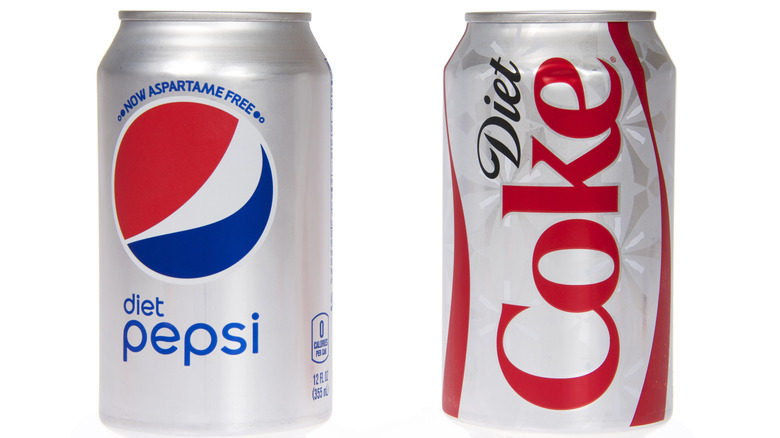The Unexpected Side Effect Of Drinking Diet Soda
Even though diet sodas have been popular for decades, they've never really gotten a unanimous 'thumbs-up' from the health community. Research over the years has produced a mixed bag of results over whether drinks containing low-calorie, nonnutritive sweeteners (NNS) actually help anyone lose weight, and whether they are healthful in the long term. But now, recent research adds another surprising side effect to the diet soda issue — drinking them may actually stimulate appetite, making you hungrier (via WebMD).
A study led by researchers at the Keck School of Medicine of USC showed that, for women and people with obesity, the areas of the brain that are responsible for food cravings and appetite showed a greater increase in activity after drinking 'diet,' sucralose-containing drinks than after drinking beverages containing real sugar (via News Medical). Also, the women who drank sucralose-containing drinks ate more at a buffet afterward than their 'real sugar' counterparts.
Research shows that diet drinks may stimulate appetite
Dr. Kathleen Page, the study's corresponding author and an associate professor of medicine at Keck School of Medicine, explains, "By studying different groups we were able to show that females and people with obesity may be more sensitive to artificial sweeteners. For these groups, drinking artificially sweetened drinks may trick the brain into feeling hungry, which may in turn result in more calories being consumed" (via News Medical).
The study also found that, for both men and women, drinking the diet drinks was followed by a decrease in the amount of hormones that trigger a feeling of satiety or fullness (via Verywell Fit). This reinforces that drinks containing nonnutritive sweeteners could actually leave you feeling hungrier.
Stephanie Kullmann, a post-doctoral fellow at the Institute for Diabetes Research and Metabolic Diseases of Helmholtz Zentrum München at the University of Tübingen in Germany, says, "Adding nonnutritive sweeteners to our diet to increase sweetness could impair the brain's responsivity to food, with negative consequences for eating behavior and metabolism, particularly in women" (via WebMD).


